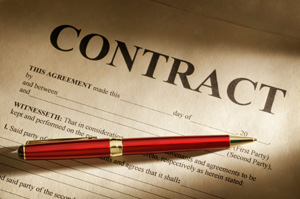Contracts 101: Read Twice, Sign Once
Fast and loose; quick and dirty; speedy and greedy are three ways to describe businessmen and women who enter into contracts without reading the fine print. As soon as an executive signs his or her name to an endlessly long legal document, the deal is sealed. The better words to describe this practice might be foolish and reckless.
The deal could be bad and put a company and its assets and employees in jeopardy. For example, a construction firm agrees to a building contract that calls for the firm to be responsible for future damage and defects that aren’t within the purview of the job. A business owner agrees to sell to a buyer who is entitled to a portion of the proceeds. A think-tank enters a partnership with another entity and is required to reveal email lists and proprietary ideas. The examples are as endlessly long as the contracts.
Such risk-takers have been described as “entrepreneurial NASCAR drivers” who frequently crash and burn.
“They don’t read them, they don’t understand them and they are not prepared for the consequences,” states an article on LinkedIn. “It’s the opposite of I came, I saw, I conquered: I rushed, I signed, I regretted.”
The reasons for not reading contracts vary. Some executives say they don’t have time and are in a hurry. Others say they have a relationship with the organization they are buying into that is backed by history. The biggest lot falls into the category of believing the document they are signing is “standard.” There is no such thing.
“Let’s dispense with the idea that most contracts are standard,” states the article. “It’s a big, fat lie. The reality is that standard contracts are rare.”
The other party might deem the contract “standard” and say there are no surprises, then persuade you to sign it. It’s a trap. Within it lies risk-shifting.
Investopedia defines risk-shifting as “the transfer of risk to another party.” It occurs every day in contracts between commercial product dealers and their customers, financial institutions and their equity owners and medical-device manufacturers and their suppliers. It affects liability as well as fees, indemnity, lawsuits and warranties. The costs to a company that made a bad deal can be significant.
A report titled “Risk Transfer: A Strategy to Help Protect Your Business” describes risk-shifting as a growing trend involving everyone from consumers to vendors.
“Agreeing to take on someone else’s liability can be costly,” reads the 12-page document authored by business insurer CNA. “By signing such an agreement, you may be forced to pay for claims that normally would not be your responsibility. Alternatively, as a condition of doing business, you may be asking one of your vendors to sign an agreement, holding you harmless. In either case, it is important to understand what you are agreeing to and limit surprises.”
Here are some steps a company can take to protect itself and its assets and employees:
- Be cautious and know that relationships fade while contracts endure. When disaster strikes, that handshake won’t hold up in court.
- Prepare a contract for your business. If you regularly enter into agreements, this is a wise use of your time and can give you more bargaining power.
- Along the same lines as preparing your own contract, prepare your own alternatives to terms that might be unfavorable.
- Identify your company’s priorities and what it is and is not willing to undertake. Make sure the contract you are signing is true to your values.
- Request and review certificates of insurance from companies with which you are doing business to ensure each is covered and operating by the book.
- Read the fine print. That might sound like a lesson from a college course called Contracts 101, but it needs to reiterated.
“It is important that your legal counsel review all written contracts to ensure they adequately protect your interests and are tailored to your specific situation,” reads the CNA report. “Use of form contracts without consulting a competent legal professional and without consideration of your particular circumstances can lead to unexpected and undesirable results.”
Share This



